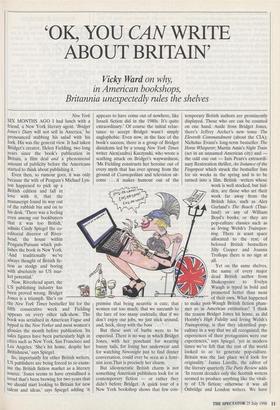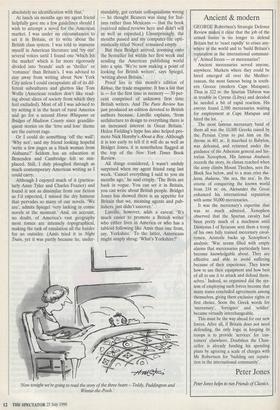'OK, YOU CAN WRITE
ABOUT BRITAIN'
Vicky Ward on why,
in American bookshops, Britannia unexpectedly rules the shelves
New York SIX MONTHS AGO I had lunch with a friend, a New York literary agent. 'Bridget Jones's Diary will not sell in America,' he pronounced stabbing his salad with his fork. His was the general view. It had taken Bridget's creator, Helen Fielding, two long years since the book's publication in Britain, a film deal and a phenomenal amount of publicity before the Americans started to think about publishing it.
Even then, so rumour goes, it was only because the wife of Penguin's Michael Lyn- ton happened to pick up a British edition and fall in love with it, that the manuscript found its way out of the rubbish bin and on to his desk. 'There was a feeling even among our bookbuyers that it was too British,' admits Cindy Spiegel the co- editorial director of River- head, the house within Penguin/Putnam which pub- lishes the book in New York. And traditionally we've always thought of British fic- tion as stodgy and boring With absolutely no US mar- ket potential.'
Now, Riverhead apart, the US publishing industry has been proved wrong. Bridget Jones is a triumph. She's on the New ,York Times bestseller list for the fifth consecutive week and Fielding appears on every other talk-show. The book was serialised in American Vogue and hyped in the New Yorker and most women's glossies the month before publication. Its sales figures have been particularly high in cities such as New York, San Francisco and Los Angeles. 'She's hit home, despite her Britishness,' says Spiegel.
So, importantly for other British writers, US publishers are being forced to re-exam- Me the British fiction market as a literary source. 'Jones seems to have crystallised a trend that's been brewing for two years that we should start looking to Britain for new talent and ideas,' says Spiegel adding 'it appears to have come out of nowhere, like Israeli fiction did in the 1980s. It's quite extraordinary.' Of course the initial reluc- tance to accept Bridget wasn't simply anglophobic. Even now, in the face of the book's success, there is a group of Bridget dissidents led by a young New York Times writer Alex(andra) Kuczynski, who wrote a scathing attack on Bridget's waywardness, 'Ms Fielding constructs her heroine out of every myth that has ever sprung from the ground of Cosmopolitan and television sit- coms . . . it makes humour out of the premise that being neurotic is cute; that women eat too much; that we succumb to the lure of too many cocktails; that if we don't enjoy our jobs, we just stick around, and, heck, sleep with the boss . . . '
But these sort of barbs were to be expected. There is no way in which Bridget Jones, with her penchant for wearing bunny tails, for losing her underwear and for watching Newsnight just to find dinner conversation, could ever be seen as a femi- nist icon.That is precisely her charm.
But idiosyncratic British charm is not something American publishers look for in contemporary fiction — or rather they didn't before Bridget. A quick tour of a New York bookshop shows that few con- Yet on the same shelves, the name of every major dead British author from Shakespeare to Evelyn Waugh is typed in bold and promoted better than most of their own. What happened to make post-Waugh British fiction plum- met so in American estimation? 'I think the reason Bridget Jones hit home, as did Homby's High Fidelity and Irving Welsh's Trainspotting, is that they identified pop- culture in a way that we all recognised; the experiences of their protagonists were our experiences,' says Spiegel. 'yet in modern times we've felt that the rest of the world looked to us to generate pop-culture. Britain was the last place we'd look for originality.' James Linville, the editor of the literary quarterly The Paris Review adds 'In recent decades only the Scottish writers seemed to produce anything like the vitali- ty of US fiction; otherwise it was all Oxbridge and London writers. We have absolutely no identification with that.'
At lunch six months ago my agent friend helpfully gave me a few guidelines should I wish to attempt a novel for the American market. I was under no circumstances to set it in Britain, or to write about the British class system. I was told to immerse myself in American literature and 'try out' several voices until I found one 'which hit the market' which is far more rigorously divided into 'brands' such as 'thriller' or 'romance' than Britain's. I was advised to stay away from writing about New York City unless I could encapsulate all of its dif- ferent subcultures and ghettos like Tom Wolfe (American readers don't like read- ing about slices of society, from which they feel excluded). Most of all I was advised to try setting it in the heart of rural America and go for a second Horse Whisperer or Bridges of Madison County since grandilo- quent stories on the 'love and loss' theme are the current rage.
Or I could do something 'off the wall'; 'Why not', said my friend looking hopeful 'write a few pages as a black woman from Alabama?' Seldom has an education at Benenden and Cambridge felt so mis- placed. Still, I duly ploughed through as much contemporary American writing as I could carry.
Although I enjoyed much of it (particu- larly Anne Tyler and Charles Frazier) and found it not as dissimilar from our fiction as I'd expected, I missed the dry humour that pervades so many of our novels. 'We are', admits Spiegel 'very lacking in comic novels at the moment.' And, on account, no doubt, of America's vast geography most tomes are intensely topographical, making the task of emulation all the harder for an outsider. (Amis tried it in Night Train, yet it was partly because he, under- standably, got certain colloquialisms wrong — he thought Beaners was slang for Ital- ians rather than Mexicans — that the book received mixed reviews here and didn't sell as well as expected.) Unsurprisingly, the months passed and my computer-file opti- mistically titled 'Novel' remained empty.
But then Bridget arrived, zooming onto the bestseller list within her first week and sending the American publishing world into a spin. 'We're now making a point of looking for British writers', says Spiegel, 'writing about Britain.'
Proof lies in this month's edition of Kirkus, the trade magazine. It has a list that is — for the first time in memory —30 per- cent comprised of unknown first time British writers. And The Paris Review has just produced an edition devoted to British authors because, Linville explains, 'from architecture to design to everything there is an increased interest in Great Britain.' Helen Fielding's hype has also helped pro- mote Nick Homby's About a Boy. Although it is too early to tell if it will do as well as Bridget Jones, it is nonetheless flagged at the top of the New York Times Book Review.
All things considered, I wasn't unduly surprised when my agent friend rang last week. 'Cancel everything I said to you six months ago,' he said crisply. 'The Brits are back in vogue. You can set it in Britain, you can write about British people. Bridget Jones has showed there is an appetite for Britain that we, meaning agents and pub- lishers, just didn't uncover.'
Linville, however, adds a caveat. 'It's much easier to promote a British writer who either lives in America or who has a tabloid following like Atnis than one from, say, Yorkshire.' To the latter, Americans might simply shrug: 'What's Yorkshire?'



























































 Previous page
Previous page